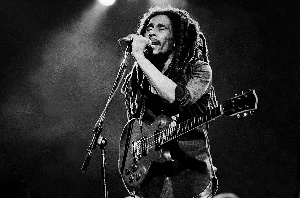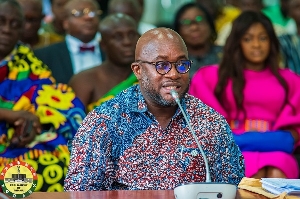Africa Entertainment News of Friday, 26 January 2024
Source: bbc.com
How Kingsley Ben-Adir became Bob Marley on the set of Barbie
Actor Kingsley Ben-Adir knows what its like to play an iconic black leader.
In the last four years, he has portrayed former US president Barack Obama in The Comey Rule and civil rights activist Malcolm X in One Night In Miami.
But even for him, the prospect of becoming Bob Marley was daunting.
"You can't mimic him, you can't copy him, you can't choreograph him," says the 37-year-old. "It's just not possible. It's too spontaneous."
So when the opportunity first arose, he turned it down. The weight and the risk simply felt too big.
"It's a heavy burden and a very serious role," agrees Ziggy Marley, Bob's son and one of the custodians of his legacy.
"You look and you say, 'Who can hold this?'"
The search took more than 30 years. Martin Scorsese and Oliver Stone were among the directors who tried, and failed, to bring the reggae legend to the big screen.
His widow, Rita, also came close. Miramax snapped up the rights to her autobiography in 2008, and Rita told reporters she wanted Lauryn Hill to play her, but the project never got off the ground.
The man who finally made it happen is Reinaldo Marcus Green. He was approached by Paramount Studios while editing King Richard - the Oscar-winning drama about the father of tennis legends Venus and Serena Williams - and instantly felt a connection to the material.
What hooked him was the story. Instead of a traditional cradle-to-grave biopic, this film would be devoted to a single, two-year timespan.
It opens in 1976, when Marley was already a star and Jamaica was in political turmoil. A wave of political shootings and firebombings rocked Kingston, as rivalries between the two major political parties spilled onto the streets.
Although Marley tried to remain neutral, he angered both sides when he organised a concert for peace.
Two days before the show, seven armed gunmen stormed into the star's "safe house" at 56 Hope Road as he rehearsed with his band. Rita Marley was shot in the head. A bullet aimed at Bob's chest missed and lodged in his arm.
Miraculously, both survived. But soon afterwards, the singer exiled himself in London, where he poured his feelings of betrayal, anger and ultimately hope into a new album, Exodus.
Released in 1977, it contains many of his best-loved hits: Jamming, Three Little Birds, One Love/People Get Ready and the evocative title track.
A landmark not just for reggae but for rock and roll, it was crowned "the best album of the 20th Century" by Time Magazine.
"Exodus is a ground-breaking innovative record," says Ziggy Marley. "The open-mindedness of the record is who Bob was."
"It was a critical time for him, rich in character and history," says Green. "By focusing on that, we get to shine some light into the man he was."
The human element was important, he adds, because Marley has become "such a God" that it's hard to imagine him struggling with things like identity, paranoia and the responsibilities of fame.
"To get a sneak peek into that - who he was, how he thought - it's pretty incredible."
A Bob Station in Barbie-land
Ben-Adir thought so, too. When he read the script for One Love, he abandoned his fears and sent in a blind audition.
"It was the first tape where I thought, 'Wow, what presence'," says Green.
"His face, his eyes said so much behind the lens. I instantly knew we had the foundation to build something."
There was one problem: Ben-Adir didn't sing or dance, and he couldn't play guitar. And when he accepted the role, he only had 10 weeks to prepare.











